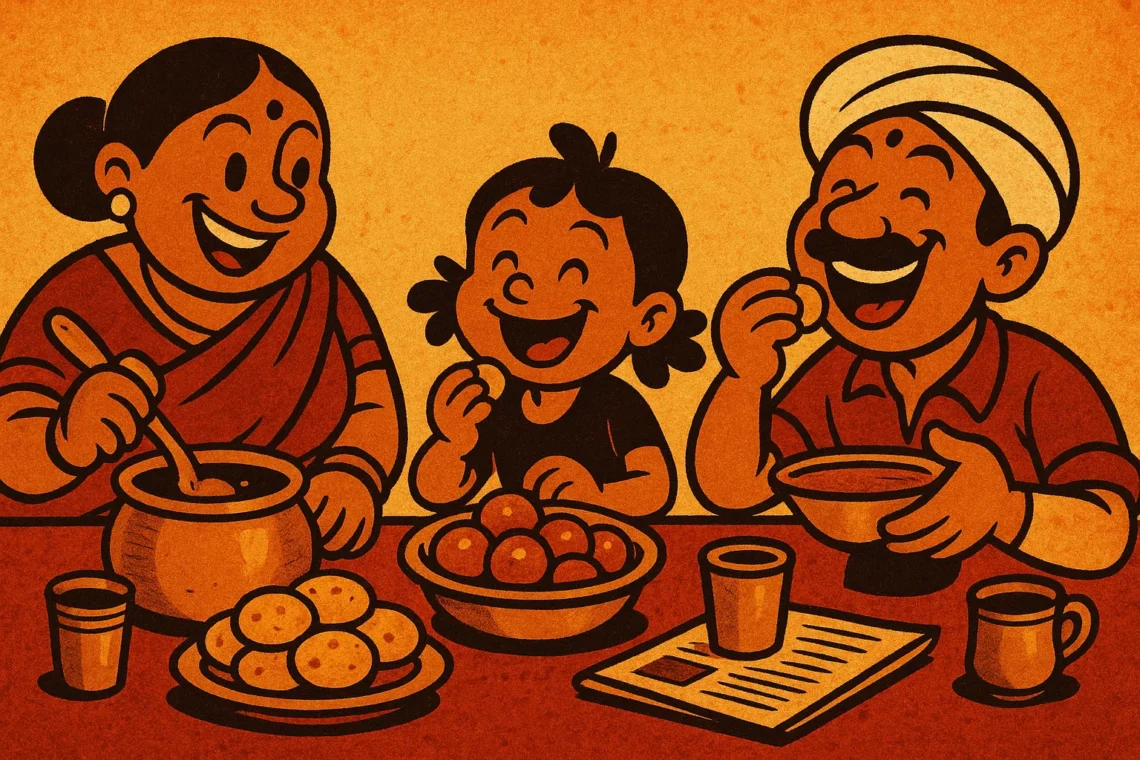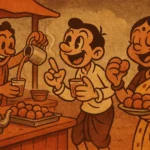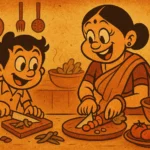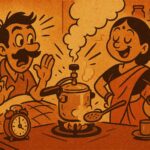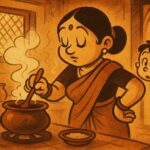Some mornings arrive loudly — alarms screaming, phones buzzing, kitchens clanging — but not the ones I remember most. The mornings I carry with me are quieter. Slower. Built on three sacred elements: a cup of chai, a freshly folded newspaper, and a silence so complete it didn’t feel empty — it felt earned.
Growing up in Mumbai, my father had a morning routine that was as fixed as the sun. He woke up before everyone else, even the crows. The gas stove’s soft tick-tick-whoosh was often the first sound I’d register through sleep. The milk would be warming. Tea leaves steeping. The rustle of newspaper pages being separated, folded, smoothed out. Not a single word was said. But everything was understood.
The Chai That Anchored the Day
Chai in our house wasn’t rushed. It wasn’t a “grab-and-go” thing. It was deliberate. Poured slowly into steel cups. Sipped without distraction. Slightly too hot at first, so you had to wait. And in that waiting, something softened inside you. Thoughts became clearer. The day stopped being an oncoming storm and started feeling like something you could manage, one sip at a time.
I remember once asking my dad why he never talked during tea. He looked over the rim of his glass and said, “Because everything important starts after chai. Not during.” He wasn’t being poetic. He just meant that tea was the time to listen — to the birds, to your thoughts, to the unfolding city outside the balcony.
The Newspaper as Ritual
Before news apps, before social media scrolls, there was the paper — damp from the press, its ink still rubbing off on your fingers. My dad read it in a specific order: front page, then cricket, then editorials. Never politics first. Never entertainment before headlines. If the paper was a person, he treated it with respect. I’d try to peek over his shoulder, and he’d wordlessly tear off a page and pass it to me. That small act felt bigger than it was. It meant, “You’re ready to read with me now.” I always started with the comics.
That silence wasn’t cold or distant. It was companionable. Two people sharing space, time, and chai — without the pressure of conversation. The world could wait. The chores could wait. Even the pressure cooker knew not to whistle yet.
The Value of Saying Nothing
In a culture that thrives on noise — WhatsApp groups buzzing before sunrise, breaking news every hour, kitchens busy from the moment you open your eyes — this kind of stillness feels rare. Radical, even. But it taught me that presence doesn’t always need to be announced. Some of the most profound intimacy is found in the quiet things we do together.
Now, in Austin, my mornings are messier. I check emails too early. I reheat tea in the microwave, which my dad would call sacrilege. I scroll headlines on my phone while brushing my teeth. But some Sundays, when the house is still and no meetings loom, I try to recreate that old ritual. I brew chai properly — loose leaves, fresh ginger, real patience. I sit on the balcony with a printout of the Sunday paper (yes, I still subscribe). I sip slowly. I say nothing.
What Silence Gives
We often mistake silence for absence. But in those mornings, silence was abundance. It gave space for reflection, for calm, for beginning the day on your own terms. It was the opposite of loneliness. It was the sound of two people trusting that their being there was enough.
The world will always return with its noise — deadlines, traffic, demands, decisions. But in between all that, if you’re lucky, you’ll find a little window of time. Just enough for a cup of chai, a newspaper, and a silence that doesn’t ask anything of you — except to be still and let the day come slowly.
Born in Mumbai, now stir-frying feelings in Texas. Writes about food, memory, and the messy magic in between — mostly to stay hungry, sometimes just to stay sane.

